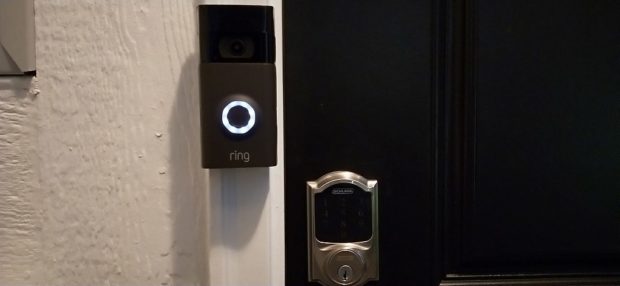There’s a common misconception that installing smart home equipment can negatively impact interior design. However, it’s possible to enjoy the best self monitored home security system in your house or apartment without spoiling the interior aesthetic.
Are you one of those homeowners who prioritize aesthetics? If so, installing a home alarm system or other smart devices without proper planning may decrease the level of satisfaction with your décor and even the level of comfort. Consider the following tips on how to blend high-end smart devices with a particular style of your home.
Coordinate the colors
With the wide range of choices on the smart home market, it won’t be a problem to find a color option you want. For example, smart doorbells usually have the same square shape, but you can get a product that matches the color of your front door, doorknob, or house numbers.
Inside your home, you can also add devices with color patterns that fit. Usually, the elements of security systems have a basic color, mainly white or black. For brightly painted walls, white or black details can add contrast. But if you prefer monochrome, you can simply paint the devices.

AG20044018, CC BY-SA 4.0, via Wikimedia Commons
Matching the color is not just a question of aesthetics or personal preference. It also has a practical benefit. Security devices become less visible. This increases the chances that they won’t catch the intruder’s eye. The system will sense an intruder’s presence, and you and a monitoring center will be notified and will take immediate measures.
Hide the wires
Trends in interior design are constantly changing, but something remains stable: cords and cables are unattractive. Wires are usually quite cumbersome, and they can definitely be an eyesore. Besides, they can expose the presence of the security camera.
Leading security systems companies are increasingly cutting the cords in favor of wireless products. Firstly, they are easier to self-install. Secondly, wireless devices excellently blend with the chosen place. Thirdly, they transmit every data byte continuously and efficiently to a connected monitor center as good as traditional wired devices.

The big advantage of wireless cameras is secured footage. Your recordings are sent to the cloud. So, if a potential thief breaks your monitor, you will have the saved video ready to access when you need it. That’s a valuable feature as police solve only 13 percent of burglary offenses, mainly due to a lack of witnesses or physical evidence. With cameras, you will be in those 13 percent.
Smart home devices are connected with a hub/control panel via Wi-Fi in a wireless security system. A homeowner controls their property via a special mobile app.
Wired security systems also have their benefits, which include high reliability and consistency. They are less susceptible to incidental or purposeful radio or electrical interference, blockage, or mimicking by a hacker. And they use a backup battery system during electrical interruptions.
If you choose to go for a wired solution, you’ll need to be creative with hiding power cords. There are several options.
The easiest way is to hide the wires behind the furniture simply. If it’s not possible, you can paint the wire covers to match your wall’s color and run them near the floor to make them less visible. The best (but also laborious) solution is to drill the walls, lay wires in the walls and ceilings, and fill in all of the unappealing holes created during the process.
Instead of hiding, balance, or mask it
In comparison to the early days of home security gadgetry, the latest kits are positively elegant. They can be integrated with any type of design, from rustic, country-chic houses to ultra-modern residences.
For example, put a white metal camera on a wooden shelf, add a vase, and a small statue in the same pattern as the cam, and you’ll get a balanced, appealing look.
Placing interior security elements in strategic positions and maintaining décor at the same time may seem even more difficult. But there are several ways to do that.
Pro tips:
- Some companies offer a special service – cameras skins – that makes cams truly discrete. They come in different shapes and designs. For example, there’s a type of skin that looks like a kid’s toy. It can be a brilliant option if you want to hide a camera in a child’s bedroom. It’s possible to disguise cameras with such household objects as smoke detectors, fake potted plants, lamps, tissue boxes, etc. This naturally blends them into the design and outwits the invader.
- A control panel can be placed in a closet or anywhere out of sight to be easily accessible when needed.
- Some people go even further and hide their control panels under hinged canvases. You can also hang the panel on a wall and attach a painting or photo canvas that matches your interior design.
Create an “unplugged” room
Technology is everywhere. Sometimes, you may feel like taking a rest from it. You are not alone in your wish. The National Day of Unplugging movement encourages people to sign a pledge of unplugging for 24 hours during March 5-6, 2021. But you don’t need to wait.
Of course, it’s a challenging task. TVs, laptops, smartphones, security sensors and cameras, and other devices have become usual in our bedrooms, kitchens, and family rooms.
Making a “disconnected” room is an excellent idea if you feel sick and tired of media and all those tech gadgets.
Convert a small room or area into a place where you can escape from checking social networks or watching the news. A comfortable sofa, some nice plants, and a shelf with books can help you. Smart home technology has many benefits, but it shouldn’t rule your whole life.
So, smart home devices can have a sleek design and still perform their functions. Making your living place more convenient and safer no longer means sacrificing aesthetics. Incorporate any gadgets you like to make your stylish home smarter.
